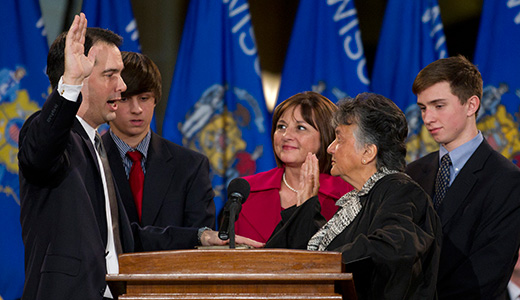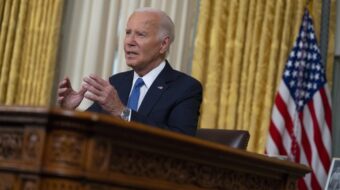
MILWAUKEE – Three years ago, during a balmy summer night in Madison, Wis., I came across a large house on the lake. I was canvassing for Citizen Action of Wisconsin on the issue of health care reform. I remember how awful the mosquitoes were that night, making it very difficult to talk to the public. Evening had fallen and the Capitol building’s reflection on the lake was quite spectacular to behold.
When I got to the houses on the lake, I noticed they were all quite large. Not one of them looked like another, and they all had that “liberal” air. So far the night had gone well, as expected, as I got to talk to and gain support from many people in my “turf.” When I knocked on the door of this particularly spacious house, an elderly, petite woman answered the door. I gave her my rap and she listened intently. I remember her kind. intelligent eyes taking in my entire speech. When I finished and asked for her support, she said she would love to help out, but couldn’t since she was on the Supreme Court of Wisconsin and had to be impartial about political matters. I told her I would keep her name out of things if she would support us, but she graciously declined. She wished me luck and then bid me adieu.
As I left, I noticed her mailbox had six or more containers for various newspapers and periodicals. I muttered to myself that she was certainly eager to keep informed about the day’s events. Then I saw her name humbly painted on the mailbox: “S. Abrahamson.” It was then that I realized I had just chatted with the Chief Justice.
I remember my feelings at the time: I was disappointed that I could not elicit her support. In my enthusiasm to make the world a better place with health care reform, I didn’t take into account the larger issue Abrahamson was exemplifying.
Last week, Justice Abrahamson did not go along with the majority in the state Supreme Court which reinstated Gov. Scott Walker’s “budget repair” amendment wiping out collective bargaining for most public employees. The majority overturned a circuit judge’s decision that the Republican-controlled legislative committee violated the state’s open meetings law when it hastily met in March to push through the highly controversial amendment.
I eagerly read her dissent in its entirety. I was struck by her effort to keep the court pure, which is to say, free and impartial from the other branches of government, and from special interest groups, and it brought me back to that balmy day in Madison.
Over and over again she made the same point, as if she were trying to convince someone deaf to her pleas. Here are some examples.
- Only with a reasoned, accurate analysis can a court assure the litigants and the public that a decision is made on the basis of the facts and law, free from a judge’s personal ideology and free from external pressure by the executive or legislative branches, by political parties, by public opinion, or by special interest groups.
- A court assumes that the legislature says what it means, and means what it says. The words in a statute are not to be treated as rhetorical flair.
- Playing by the rules and playing fair are integral to public trust and confidence in our government officials – legislative, executive, and judicial. Public confidence in the integrity of the judicial branch is engendered by a court’s issuing a reasoned public decision based on public records after public arguments.
- Trust and confidence in the integrity of the judicial branch as an institution is critical at all times but especially when a case has high public visibility, is mired in partisan politics, and is emotionally charged.
- The order and Justice David Prosser’s concurrence are based on errors of fact and law. They inappropriately use this court’s original jurisdiction, make their own findings of fact, mischaracterize the parties’ arguments, misinterpret statutes, minimize (if not eliminate) Wisconsin constitutional guarantees, and misstate case law, appearing to silently overrule case law dating back to at least 1891.
- The order and Justice Prosser’s concurrence put in jeopardy prior case law that declares that a court may determine whether legislative action in enactment of a law complies with a relevant constitutional directive.
- There is no liberty if the power of judging be not separated from the legislative and executive powers.
Some people called her dissent “scathing” or “stinging.” I call it a much-needed reminder to play fair, to think and judge without bias, and to use critical thinking skills to the highest degree. Perhaps the only surprising thing about her comments is that she had to make them at all. But I am not surprised that she maintained her integrity, as I witnessed it first-hand. What is so badly lacking in many who sit on the court is this sense of fairness and this respect for the law.
Chief Justice Abrahamson’s voice rings out true and strong in the concluding comments of her dissent:
“The majority, by sacrificing honest reasoning, leads us down a pernicious path. The order today departs from fundamental principles. It fails to abide by the court’s Constitutional authority and its own rules and procedures and harms the rights of the people from whom our authority derives.”
Scathing? I don’t see it. Apropos? Indeed.
Photo: Swearing to uphold the law: Wisconsin Supreme Court Chief Justice Shirley Abrahamson swears in Scott Walker as governor in the rotunda of the state Capitol, Jan. 3, 2011, in Madison. (AP/Morry Gash)












Comments